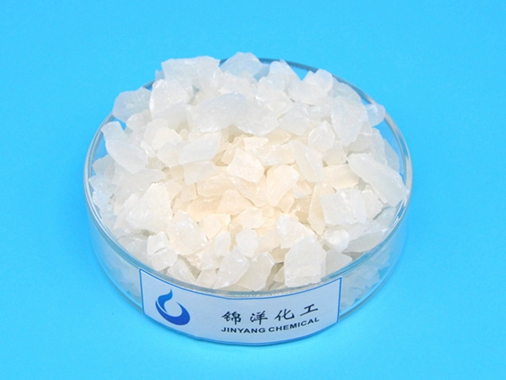

.jpg)
Properties and Formulation:
Aluminum sulfate typically appears as white or colorless crystals, although it can also be found in anhydrous form or as a hydrate. It is soluble in water and forms solutions that are acidic due to the hydrolysis of the aluminum ion in water.
Applications:
1. Water Treatment: One of the primary uses of aluminum sulfate is in water treatment processes. It acts as a coagulant in the purification of drinking water and wastewater treatment plants. When added to water, it reacts with dissolved particles and colloids, forming larger flocs that can be more easily removed by filtration or settling.
2. Paper Industry: Aluminum sulfate is used in the paper manufacturing industry as a filler and binder. It helps to improve the paper's characteristics such as opacity, brightness, and strength. Additionally, it aids in controlling the pH of paper-making slurries.
3. Textile Industry: In textile dyeing and printing, aluminum sulfate is employed as a mordant. It helps to fix dyes onto fabrics by forming coordination complexes with the dye molecules.
4. Other Uses: Aluminum sulfate finds applications in various other industries, including:
Treatment of wastewater from industries like textiles, petroleum refining, and pharmaceuticals.
Clarification of fats and oils.
Manufacture of fire extinguishing agents.
Production of catalysts and inorganic pigments.
Health and Safety Considerations:
While aluminum sulfate itself is not highly toxic, prolonged exposure to large amounts may cause irritation to the skin, eyes, and respiratory tract. Proper handling procedures, including wearing appropriate protective equipment, are recommended when working with this compound.
In conclusion, aluminum sulfate is a versatile chemical compound with widespread industrial applications, particularly in water treatment and paper manufacturing, where its coagulant and pH-adjusting properties are highly valued.
1. Water Treatment:
Coagulation and Flocculation: Aluminum sulfate is widely used as a coagulant in water treatment plants. It helps to clarify water by causing suspended particles, colloids, and microorganisms to clump together (flocculate), making them easier to remove through filtration or settling.
pH Adjustment: It can also be used to adjust the pH of water, particularly in processes where acidic conditions are beneficial.
2. Paper Manufacturing:
Aluminum sulfate is employed in the paper industry as a sizing agent and paper filler. It improves paper strength, brightness, opacity, and ink receptivity. It also helps in controlling pH during the paper-making process.
3. Textile Industry:
Aluminum sulfate serves as a mordant in textile dyeing and printing processes. It helps to fix dyes onto fabrics by forming complexes with the dye molecules, thereby enhancing color fastness and uniformity.
4. Construction and Cement Industry:
In construction, aluminum sulfate is used as a waterproofing agent and accelerator for concrete. It can also improve the properties of cement-based materials.
5. Chemical Manufacturing:
Aluminum sulfate is a precursor in the production of various aluminum compounds, including aluminum hydroxide, aluminum oxide, and alumina. These compounds find applications in industries ranging from ceramics to pharmaceuticals.
6. Leather Tanning:
It is used as a tanning agent in leather processing to help preserve and soften hides.
7. Fire Retardants:
Aluminum sulfate is used in the manufacturing of fire extinguishing agents and fire retardant materials.
8. Other Industrial Applications:
It finds use in wastewater treatment across different industries, including textiles, petrochemicals, and food processing.
Aluminum sulfate is also used in the manufacturing of alum, which is employed in pickling, food preservation, and as an ingredient in baking powders.
These diverse applications highlight the importance of aluminum sulfate in various industrial processes where its coagulation, flocculation, pH adjustment, and chemical properties are advantageous.
1. Water Treatment:
Coagulation: Aluminum sulfate is added to water in a process called coagulation. Typically, it is dosed into water at concentrations sufficient to achieve the desired coagulation and flocculation of suspended particles. The amount used depends on factors such as water quality, turbidity, and the specific treatment goals.
Dosage: The dosage of aluminum sulfate is critical and is often determined through jar testing or pilot studies to optimize its effectiveness in removing impurities.
2. Paper Manufacturing:
Sizing Agent: In paper-making, aluminum sulfate is added to the pulp slurry to adjust pH and control the sizing of paper fibers. It enhances paper strength, brightness, and ink receptivity.
Application: It is typically added at specific stages of the paper-making process, such as during pulp preparation or at the wet end of the paper machine.
3. Textile Dyeing:
Mordant: Aluminum sulfate acts as a mordant in textile dyeing. It is applied either as a pre-treatment to the fabric or directly with the dye bath to improve the adherence and fastness of dyes on textiles.
Procedure: Fabrics are treated with a solution of aluminum sulfate before dyeing to ensure uniform and lasting color.
4. Soil Acidification:
Aluminum sulfate can be used to adjust soil pH, particularly in gardening and agriculture where acidic soil conditions are needed for certain plants. It lowers soil pH, making it more acidic and suitable for acid-loving plants like azaleas, rhododendrons, and blueberries.
5. Other Applications:
Leather Tanning: It is used in leather processing as a tanning agent to soften and preserve hides.
Fire Retardants: Aluminum sulfate is used in the production of fire extinguishing agents and fire retardant materials.
General Guidelines for Using Aluminum Sulfate:
Always follow manufacturer instructions and recommended dosage rates for specific applications.
Use appropriate protective equipment (gloves, goggles) when handling aluminum sulfate, especially in concentrated forms.
Dissolve aluminum sulfate in water before application unless otherwise specified.
Monitor water quality and pH adjustments when using aluminum sulfate to ensure desired outcomes are achieved without unintended consequences.
In all applications, the precise method and amount of aluminum sulfate used depend on factors such as the specific process requirements, desired results, and environmental considerations.